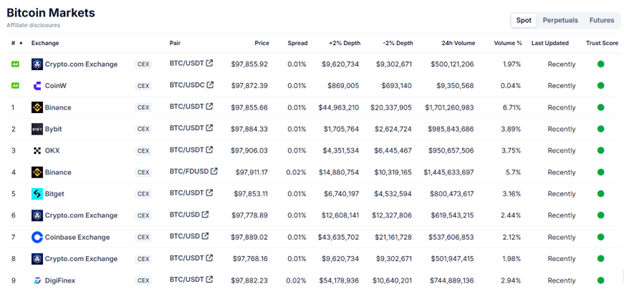 |
| By Bob Czeschin |
Imagine this …
You used a centralized exchange to invest in Bitcoin (BTC, “A-”).
Your investment grows nicely over the course of a few months, so you decide to grab your gains and convert back to fiat.
Of course, you expect to see some fees on the transaction — network fees, exchange fees, etc.
What you don’t expect is to pay a sizable percentage of your gains in fees!
That exact scenario happens more often than you’d think. That’s because fees on centralized crypto exchanges come in various forms …
But only some are transparent.
Others are buried under layers of menus and sub-menus. Or concealed in price spreads — which can be a snare for casual traders.
Here’s how to thread your way through the maze … to get the best deal tailored to your specific situation.
Coinbase’s Hidden Hazards
We start with Coinbase, America’s biggest, most famous centralized crypto exchange (CEX).
And let us make no bones about it: Coinbase charges a lot.
Consider, for example, a simple market order to buy US $8,000 worth of Bitcoin. For this, Coinbase charges 0.6% ($48) right out of the gate.
By contrast, the trading fee on Uniswap (UNI, “C”), the world’s largest decentralized exchange (DEX), would be only 0.3%.
That’s a big difference.
To get a comparable rate on Coinbase, you’d have to pony up a hefty $50,000 per trade to meet the minimum order size required to qualify for such a discount.
Ouch.
But the trading fee is just the start. Several other fees and factors can eat into your bottom line, including …
- Invisible spread charges. If you trade on Coinbase’s basic (not Advanced Trade) platform, an additional 0.1%–0.5% spread charge is probably being embedded in the displayed price you’re asked to accept.
-
Slippage. If you’re not using Advanced Trade, you could be getting less bang for your BTC.
Slippage is when your order fills at a different price than what you targeted. This happens when the price of your assets change dramatically as your transaction processes.
On Advanced Trade and on DEXes, you can adjust your tolerable slippage as you like. Our team suggests between 1%-3%. But on Coinbase’s regular exchange, you’re locked into a 10% slippage.
- Fiat deposit and withdrawal fees. Coinbase charges you $10 every time you put U.S. dollars into your exchange account. And $25 when you take ’em back out.
- Crypto withdrawal fees. You pay these whenever you move crypto off the exchange and into a private digital wallet. Plus, additional charges based on blockchain congestion.
-
Staking commissions. If you want to stake your crypto to earn passive income, Coinbase will also handle this. In exchange for a substantial fee, of course.
For example, it charges a fat 26.3% to 35% commission on staking income for several coins, like Ethereum (ETH, “B+”), Solana (SOL, “B”) and Cardano (ADA, “B+”), among others.
That’s a hefty cost considering the average yield on Coinbase is in the single digits. Meanwhile, DeFi platforms routinely offer double and even triple-digit yields on the same tokens.
- Opportunity costs. There are usually far fewer crypto trading pairs available on CEXes like Coinbase. That’s partly because most new cryptos initially come to market on DEXes first. Strong coins only show up on CEXes weeks or months later — if at all!
So, if you like to invest ahead of the thundering herd, trading only on Coinbase can be a crippling limitation.
Benefits Beyond Low Fees
So, why do investors choose to use CEXes like Coinbase?
Because there’s more to getting value for money, as a crypto investor, than merely zeroing in on the lowest up-front charges.
Coinbase’s high fees also pay for several less tangible, but still potentially valuable user benefits.
Such as …
- A famous brand. Coinbase is one of the most reputable names in the industry, which many people find reassuring.
- A simple, mostly jargon-free user interface. Simply put, newcomers to crypto are likely to find CEXes easier to navigate than a DEX.
- Password protection. Lose your password? Coinbase will hold your hand, re-verify your identity and establish a new one. By contrast, if you’re a DEX-user and lose your wallet password … well, you’re on your own! And risk losingyour crypto.
- Stronger regulatory oversight. This may provide a welcome measure of protection against, say, another FTX-style debacle, where exchange insiders looted customer accounts. To be sure, such events are very rare. But some folks still worry.
- U.S. tax-compliant record-keeping. For U.S. citizens and residents, every crypto trade is a taxable event. Coinbase supports the extensive reporting requirements of the American IRS.
The DEX Alternative
Uniswap is built on the Ethereum blockchain.
There is no central authority or exchange account holding your crypto, like with a CEX. Rather, you use your keys — which you get when you set up a software wallet — to authorize the smart contract to facilitate your transaction.
This also means no intrusive know-your-customer demands before being allowed to trade.
And because a DEX is basically just a bunch of smart-contracts and bots that run mostly on autopilot, operating costs are low.
Indeed, the major expense DEXes face is to compensate liquidity providers who pony up the crypto capital to support the trading pairs accommodated by the platform.
In fact, that’s exactly what Uniswap’s 0.3% trading fee is mainly for.
However, as we saw with Coinbase, the up-front trading fee … is not the whole story. Other costs include:
-
Network charges (gas fees): These are used to compensate the validators who verify and process each transaction on its native blockchain.
On Ethereum, these fees can be substantial (often $5 to $50+) when the network is overloaded.
But users can also deploy Uniswap on several other networks, such as Arbitrum (ARB, “B-”), to target lower fees. This can be a bit complicated, however, especially for newcomers.
Alternatively, users can target DEXes on other networks, such as Jupiter (JUP, Not Yet Rated) on the Solana network, which is praised for its high speeds and low costs.
- Interface fee: This is a 0.25% charge applicable to trades done via the Uniswap website that involve certain tokens. Though, these are avoidable simply by steering clear of those tokens.
What to Use: CEX or DEX?
So, should you stick to centralized exchanges, or is it better to delve into the world of DeFi and use a DEX?
Well, it depends.
If you are …
- Relatively new to crypto …
- Comfortable exchanging anonymity and trustlessness for additional security and ease of use …
- Comfortable with third-party control over your assets …
- A long-term investor and don’t plan to trade often …
Then you may want to consider a CEX.
And if you do, you can still minimize fees by trading in larger volumes and not funding your Coinbase account with credit or debit cards, as these incur charges on top of Coinbase’s fiat deposit fee.
But, if you …
- Know how to open and maintain your own wallet …
- Want to maintain custody of your own crypto …
- Are an active trader concerned about high transaction fees …
- Want to target higher yields for staking …
Then a DEX on a low-cost network may be right for you.
Experienced investors will often use a combination of CEXes, DEXes and aggregators to hunt for the best prices and lowest fees to maximize their strategies.
There are a few ways to find the options available. But a quick way is to head over to Coingecko.com.
In the search bar, type in the coin you are interested in, and select it. Then, scroll down to Markets.

There, you’ll see a list of every exchange — both centralized and decentralized — that supports your chosen crypto.
The rest will be up to you.
Best,
Bob Czeschin

